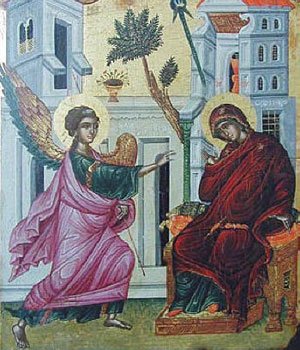
© Photo: www.pravoslavieto.com
On March 25th, a miracle happened – Saint Archangel Gabriel brought Virgin Mary the glad tidings that she would conceive immaculately and would give birth to the Savior, our lord Jesus Christ. The official feast of the Annunciation in Orthodox Christianity is known in Bulgaria as the day of Blagoveshtenie or Blagovets (meaning the day of the glad tidings). In Bulgarian folklore that has its outlook directed entirely to the processes occurring in nature, the good news is that spring has arrived.
According to folk beliefs, the arrival of spring is announced by the songs of the cuckoos as the call of the cuckoo is the harbinger of spring.
Bulgarian folk wisdom has it that on the Day of Blagovets, the cuckoo flies back to Bulgarian lands from the warmer countries in the South, bringing the glad news that winter was going away and that the fruitful and rich summer was on its way. Once, in the region of Veles, historically a region of Bulgaria in its western parts) when people heard the cuckoo call, they went to the fields and put a piece of bread in their mouth, to protect themselves from the piercing call of the cuckoo.
In the region of Gabrovo in Northern Bulgaria, people used to believe that on the Day of Blagovets if a treasure was buried somewhere, the gold coins would come out onto the surface and dance like blue flames. The gold hunters walked around hills and forests, century-old pine trees and watched these fiery flames, and if they were dancing, they knew this was the place to start digging and find a treasure. There were buffoons who would go to far-off places, set some straws on fire, put a basket on top of it and the flame turned blue. The gold hunters allured by this burning blue flame were easily deceived, they kept digging until exhaustion overtook them and in the evening in the village pub they turned into everyone’s laughing stock.
On Blagovets, everyone tried to be well fed so that when the cuckoo started calling, they would not be hungry and would have money in their pockets. Bulgarian folk wisdom has it that on this day snakes emerged out of their lairs. And to keep their homes, housewives woke up before dawn and started rattling and clattering with metal objects to scare snakes away. On the same day, they also used to sweep the garbage, make a pile and set it on fire, and girls would jump over the fire for health.
In many places in Bulgaria, the vernal equinox is marked by a ritual tour of the yard and the villages filled with much joy and fun. Women and children made noise with various metallic objects and uttered incantations: “Run away, snakes and lizards, Blagovets is coming”. An important part of the holiday is the making of bonfires in which people symbolically burn old and useless objects. Just as on the feast of Forgiveness Sunday, young people jump over fires for health.
And the cuckoo calling on Blagovets was announcing not only good but also bad news. The good news was that spring has arrived and the bad one that with it, the evil fairies and dragons emerged out of their winter shelters. When young girls heard the cuckoo calling, they would immediately tie a knot on their kerchiefs. And then they wore it for three days, then untied it and looked inside. If there was a hair, this meant that the girl would marry this year. If there was nothing inside, this meant she would stay unmarried until next year. Girls also watched the cuckoos on that day, after the cuckoo perched on a tree and then flew away, they broke the twig and brought it home as they believed this would attract love to them…
Once young girls would gather on this day and walk round houses singing songs. No one remembers these songs any more but people remember what they were about – the cuckoo again. And it was not only singing but also speaking in human voice, warning mothers not to send their daughters for water in the morning as the evil fairies had gathered near the well.
On Blagovets, the sparrows and storks arrived back from the south. This was a great day of entertainment for children because as they saw a bird in the sky, they would cry out happily. Another popular tradition was to buy a new garment or pair of shoes and wear them on that same day – and upon putting them one, one was supposed to wish for new clothes all year round. And last but not least, it was obligatory to have fish on the table on the Annunciation. It was considered a sin not to eat fish on that day.
Translated by Rossitsa Petcova
In the Bulgarian folk tradition, the feasts of Lazarus Saturday and Palm Sunday are related holidays. From Lazarus Saturday (Lazarovden in Bulgaria), girls prepare for the ritual kumichene, which is performed on the morning of Palm Sunday. A very old..
In April and May the visitors of the Strelcha Historical Museum will have the opportunity to get acquainted with the traditions connected with the Easter holiday cycle through the exhibition A Fine Easter, a Finer St. George’s Day . Easter..
Lazarus Saturday is widely known in Bulgaria as Lazarovden , celebrated by Orthodox Bulgarians on the day before Palm Sunday. The main rite is the lazaruvane - a traditional custom centred on themes of love and marriage. Girls over the age of 16,..

+359 2 9336 661
